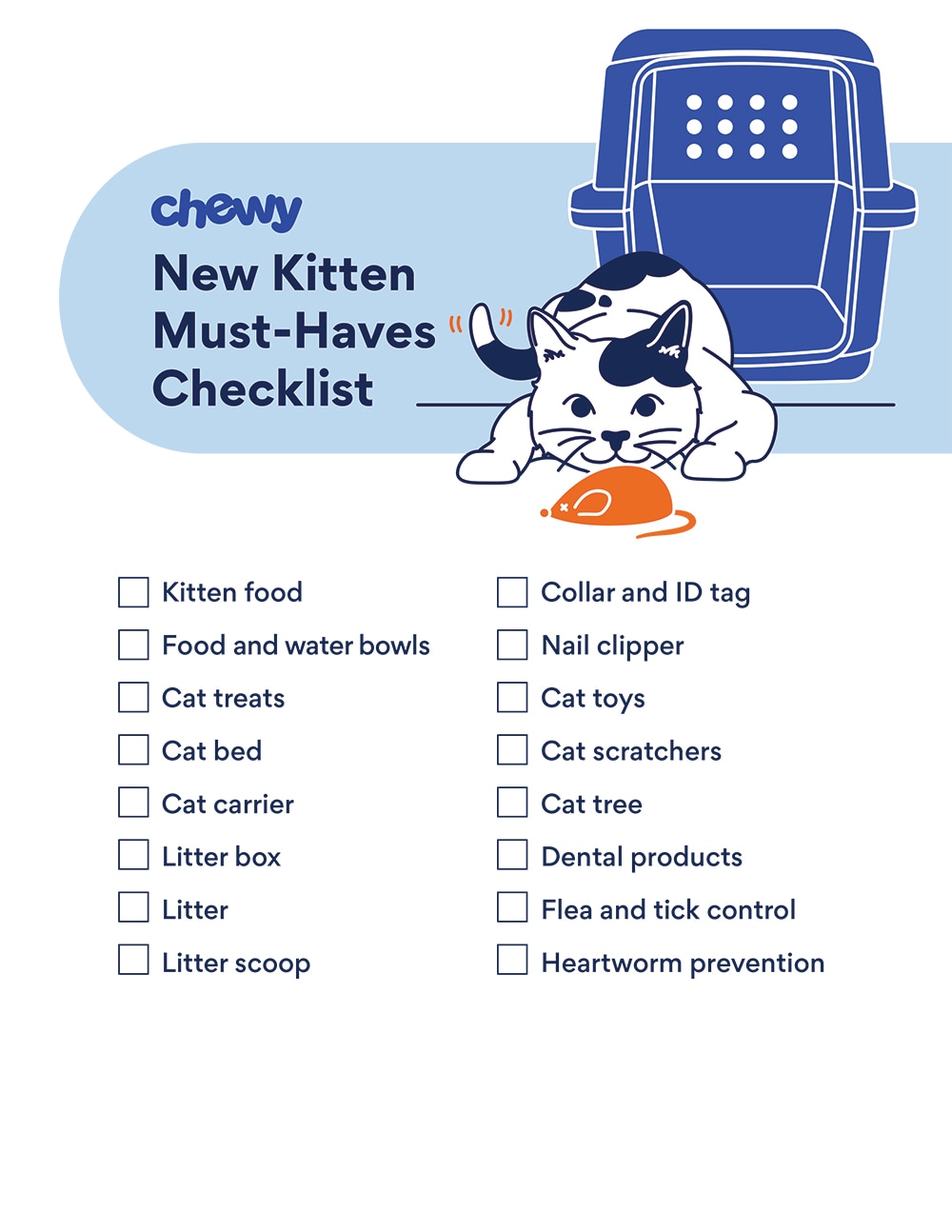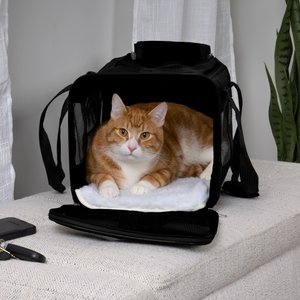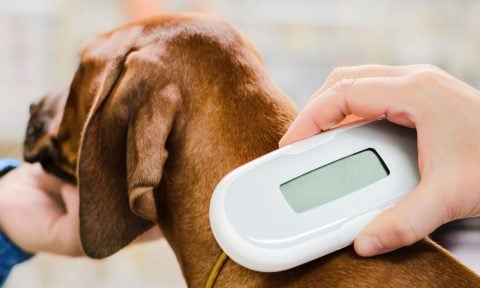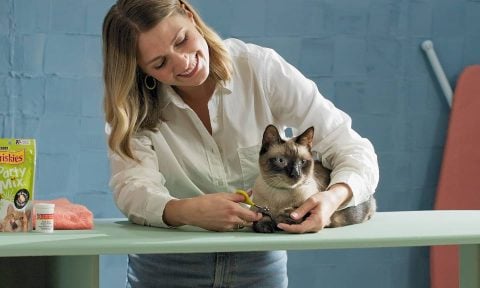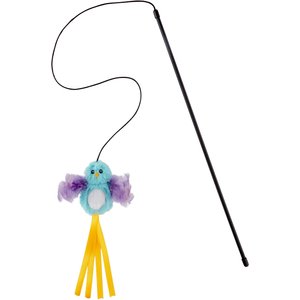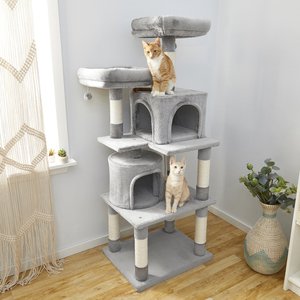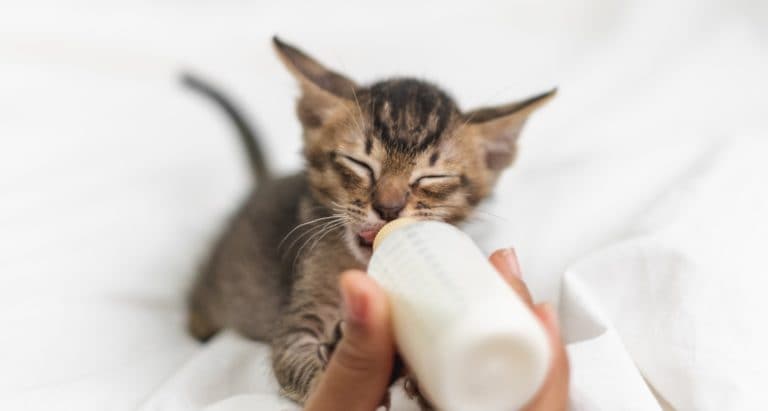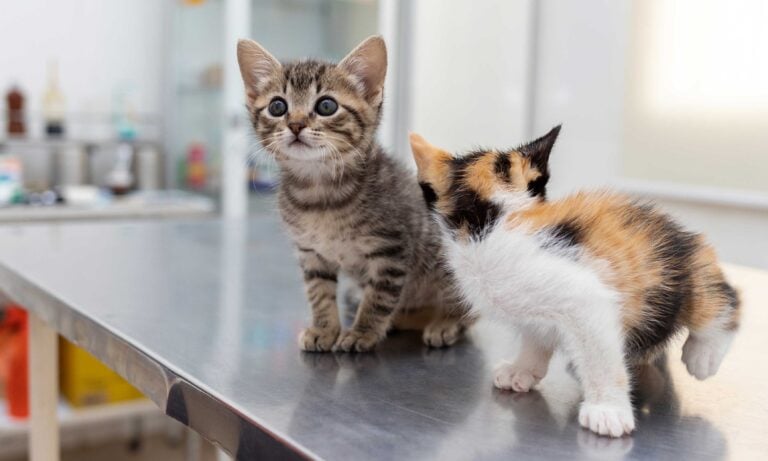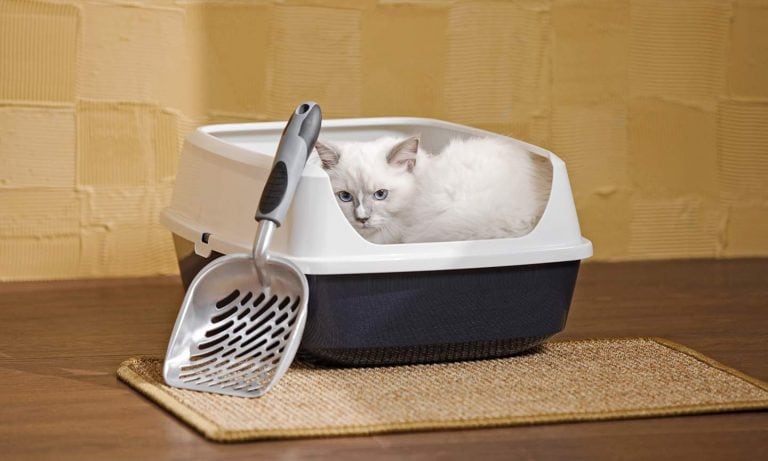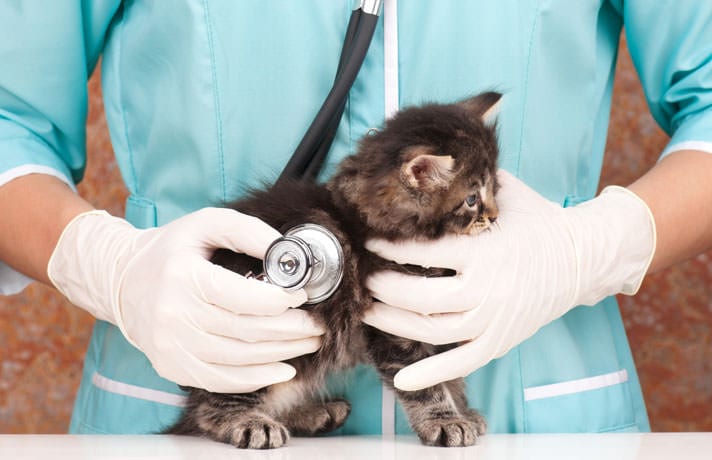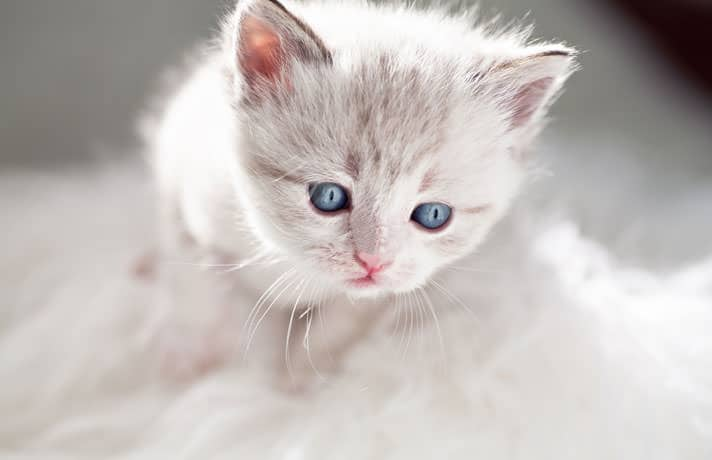So, you’re bringing a new kitten home. Hooray! Adding a cat to your family is an exciting and rewarding event that ushers joy, laughter and affection into your home.
That said, whether you’re adopting a kitten or getting one from a reputable breeder, bringing a new pet into your life requires prep work—and it’s not as simple as setting up a litter box and tossing a few mouse-shaped toys on the floor. There are several must-have supplies to gather.
To help you prepare, we spoke to experts about the kitten essentials you need to ensure your fur baby has everything they require for a smooth, safe and purr-inducing welcome home. Plus, we created a handy new kitten checklist you can save, download and print out.
New Kitten Checklist
1 Kitten Food
Before your new feline companion arrives, make sure you have a supply of high-quality kitten food on hand. The food needs to be complete and balanced with nutritious ingredients, including taurine and choline, and healthy protein sources.
As for the type of food to feed your kitten, consider giving them wet food in addition to (or in place of) dry food. Wet food has a higher water content than kibble, which helps keep cats well hydrated. Learn more about what to feed kittens.
Consult with your veterinarian on which cat food is right for your kitten.
Some options for kitten food include:
Temporarily out of stock
2 Food and Water Bowls
Your kitten’s food and water bowls should be made of non-toxic materials and appropriately sized. Opt for bowls that are shallow yet wide to help prevent your cat whiskers from rubbing against the bowl (cats hate that!). The water bowl, specifically, should hold at least one cup of water. (Kittens need about 2 ounces of water per 2.5 pounds of body weight per day.)
For kittens who eat too quickly, slow feeder bowls help slow down your kitten’s eating pace—promoting better digestion and reducing the risk of vomiting and bloating.
Our favorite water and food bowls for kittens are:
3 Cat Treats
Kittens can have treats once they’re fully weaned and on solid food, around 8 to 10 weeks old. Giving treats is a great way to bond with your new kitten and reinforce positive behavior.
Opt for protein-based treats to support their rapid growth and development, and feel free to skip the catnip for now (as most cats won’t react to catnip until they are 6 months to 1 year of age). Lastly, remember: Treats should not make up more than 10 percent of your cat’s diet.
Our favorite treats for kittens are:
4 Cozy Cat Bed
When kittens aren’t pouncing, playing and exploring, they’re snoozing. With the typical kitten sleeping anywhere from 16 to 18 hours a day, it’s crucial to have a cozy bed for them to sleep in (when your lap isn’t available, of course).
When choosing a cat bed, consider the size, the materials and the design.
Here are some kitten beds we like:
5 Sturdy Cat Carrier
When you pick up your new family member, you’ll need a sturdy cat carrier to transport them home safely.
Look for a carrier that is made of durable materials, has proper ventilation, is easy to clean and has a comfy floor pad. Learn more about how to choose the best cat carrier.
Once home, keep the carrier in an accessible location so you can easily grab it in an emergency or when you need to take your kitten to the vet.
A few cat carriers we like are:
6 Litter Box Essentials
Litter boxes and litter are vital supplies for your kitten’s hygiene and well-being—not to mention, the cleanliness of your house. Additionally, you’ll need a scooper for your kitten’s litter and a litter mat to catch stray bits of litter.
Choose a litter box with low walls, so that your kitten can easily climb into and out of it. Ideally, you should have one litter box per cat, plus one extra. (Making sure your cats have adequate space to do their business can help prevent potty issues such as peeing and/or pooping in places other than the litter box.)
Learn more about choosing the best litter box for your feline friend.
Shop litter box essentials:
7 Collar and ID Tag
Having a collar and ID tag on at all times can greatly increase the chances of a safe and speedy reunion if your kitten slips out of the house.
When choosing a collar for your kitten, opt for a breakaway collar, so your cat doesn’t injure themselves should they get caught on something. The ID tag should include your cat’s name, your name, your phone number, your address and if your cat is an indoor-only cat. Include your cat’s microchip number, too, if you have space for it.
Here are some kitten collars and ID tags we like:
8 Nail Clipper
Regular trims will keep your kitten’s claws healthy and prevent paw problems. Plus, it’ll keep your furniture, carpets and skin scratch-free. Ideally, start nail trimming when your kitten is young—as early as 4 weeks old—as this will get them used to having their paws handled and comfortable with the process.
When choosing a nail clipper, look for small ones designed for cats. This will make it easier and safer to maneuver when clipping your kitten’s nails.
Nail clippers we like include:
9 Cat Toys
Kittens are naturally curious and playful creatures, and cat toys provide a fun and interactive way for them to expend their energy and satisfy their instincts. Toys also help prevent boredom and reduce destructive behaviors, such as scratching furniture or getting into mischief (their specialty).
Cat toys include everything from small plush toys and wand-style toys to interactive toys and ball and chaser toys.
A few popular kitten toys include:
10 Cat Scratchers
Your new kitten has sharp claws and a natural urge to scratch things. Without designated scratching spots, your furniture, drapes or carpets may become the unlucky targets of their scratching frenzies. Enter, scratching posts.
Ideally, you should have multiple scratching posts and scratchers placed in visible locations in your home. These posts should be sturdy enough for your cat to really dig into them and long enough for your cat to stretch out.
Learn more about choosing the best cat scratching posts and scratchers.
Some cat scratchers we like are:
11 Cat Tree
Your new kitten needs a kingdom of their own, and a cat tree is just the ticket. Not only does a cat tree provide a royal throne for lounging and napping, but it also offers a playground of climbing, scratching and exploring opportunities.
When picking out a cat tree, you’ll want at least one big tower that is taller than your tallest piece of furniture. It should also have multiple perches and be sturdy and well built so it won’t injure your cat. Learn more about choosing the best cat tree.
A couple cat trees we like for kittens are:
Kitten-Proofing Your House
Now that you have all the essentials, it’s time to kitten-proof your home. Kitten proofing creates a secure environment for your curious little ball of fluff.
Here are some tips for kitten-proofing your home:
- Hide electrical cords: Electrical cords should be covered with cord covers or hidden away.
- Hide valuables and breakables: Don’t place any valuables or anything that could break (glass, ceramics, watches, etc.) anywhere they could easily be knocked or pushed over.
- Get rid of toxic house plants: Check all your plants against the ASPCA’s Toxic Plant List to confirm they won’t make your cat sick if they nibble on them. Learn more about the most common poisonous plants for cats.
- Secure furniture: Make sure furniture is secured and isn’t going to be knocked over if your kitten jumps or climbs on it.
- Add baby locks: Consider adding baby locks on cabinets, especially those that contain cleaning chemicals. Otherwise, ensure chemicals are stored securely where your kitten can’t reach them.
- Close toilet lids: Make sure all toilet lids are closed when not in use. Curious kittens can slip and fall in and potentially drown.
- Put human food away: While a number of human foods are safe for cats to eat, some can be toxic or, at the very least, give them a tummy ache. To play it safe, put away all human food and avoid giving them human food treats until they’re an adult.
- Check all screens and doors: Ensure all screens and doors in your house are secure and don’t have holes your cat could squeeze through.
- Block access to any appliances: This includes blenders, water heaters and furnaces.
Get Ready for a Paw-Some Adventure
By taking the time to gather all the supplies on this new kitten checklist–and kitten-proof your house–you’ll be giving your feline friend the best possible start in their new home.
Next, find out what vaccinations your kitten may need and what your kitten's first vet visit will entail.
More to know about new kittens:
Share:

